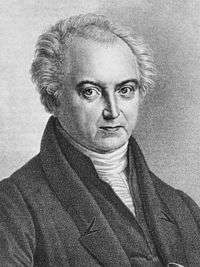Heinrich Wilhelm Matthias Olbers
| Heinrich Wilhelm Matthias Olbers | |
|---|---|
|
Lithograph by Rudolph Suhrlandt | |
| Born |
October 11, 1758 Arbergen, Holy Roman Empire |
| Died |
March 2, 1840 (aged 81) Free Hanseatic City of Bremen |
| Nationality | German |
| Fields |
Medicine Astronomy |
| Known for |
Olbers' paradox Pallas Vesta |
Heinrich Wilhelm Matthias Olbers (/ˈoʊlbərz/; October 11, 1758 – March 2, 1840) was a German physician and astronomer.
Life and career
Olbers was born in Arbergen, today part of Bremen, and studied to be a physician at Göttingen (1777–80). While he was at Göttingen, he studied mathematics with Abraham Gotthelf Kästner. In 1779, while attending to a sick fellow student, he devised a method of calculating cometary orbits which made an epoch in the treatment of the subject. It was the first satisfactory method of calculating cometary orbits. After his graduation in 1780, he began practicing medicine in Bremen. At night he dedicated his time to astronomical observation, making the upper story of his home into an observatory.
On March 28, 1802, Olbers discovered and named the asteroid Pallas. Five years later, on March 29, 1807, he discovered the asteroid Vesta, which he allowed Carl Friedrich Gauss to name. As the word "asteroid" was not yet coined, the literature of the time referred to these minor planets as planets in their own right. He proposed that the asteroid belt, where these objects lay, was the remnants of a planet that had been destroyed. The current view of most scientists is that tidal effects from the planet Jupiter disrupted the planet-formation process in the asteroid belt. On March 6, 1815, Olbers discovered a periodic comet, now named after him (formally designated 13P/Olbers). Olbers' paradox, described by him in 1823 (and then reformulated in 1826), states that the darkness of the night sky conflicts with the supposition of an infinite and eternal static universe.
In 1804 Olbers was elected a Fellow of the Royal Society of London,[1] a Foreign Honorary Member of the American Academy of Arts and Sciences in 1822,[2] and in 1827 a foreign member of the Royal Swedish Academy of Sciences.
Olbers was deputed by his fellow citizens to assist at the baptism of Napoleon II of France on June 9, 1811. He was a member of the corps legislatif in Paris 1812–13. He died in Bremen aged 81. He was twice married, and one son survived him.
Honors
The following celestial features are named for him:
- The periodic comet 13P/Olbers
- The minor planet 1002 Olbersia
- The lunar crater Olbers
- The albedo feature Olbers on Vesta's surface
References
- ↑ "Library and archive catalogue". Royal Society. Retrieved 2012-03-06.
- ↑ "Book of Members, 1780–2010: Chapter B" (PDF). American Academy of Arts and Sciences. Retrieved 7 August 2014.
 This article incorporates text from a publication now in the public domain: Chisholm, Hugh, ed. (1911). "Olbers, Heinrich Wilhelm Matthias". Encyclopædia Britannica (11th ed.). Cambridge University Press.
This article incorporates text from a publication now in the public domain: Chisholm, Hugh, ed. (1911). "Olbers, Heinrich Wilhelm Matthias". Encyclopædia Britannica (11th ed.). Cambridge University Press.
Further reading
| Wikimedia Commons has media related to Heinrich Wilhelm Olbers. |
- Bessel, F. W. (1845). "Über Olbers. Von Herrn Geh. – Rath Bessel". Astronomische Nachrichten 22 (18): 265. Bibcode:1845AN.....22..265B. doi:10.1002/asna.18450221802.
- Cunningham, C. J. (2006). The Origin of the Asteroids: Olbers versus Regner. Star Lab Press. ISBN 0-9708162-5-1.
- Herschel, William (1800–1814). "Observations on the Nature of the New Celestial Body Discovered by Dr. Olbers, and of the Comet Which Was Expected to Appear Last January in Its Return from the Sun". Abstracts of the Papers Printed in the Philosophical Transactions of the Royal Society of London 1: 271–272. doi:10.1098/rspl.1800.0148.
 Lagrange, Eugène (July 1885). "Some Self-Made Astronomers". Popular Science Monthly 27. Olbers is briefly mentioned.
Lagrange, Eugène (July 1885). "Some Self-Made Astronomers". Popular Science Monthly 27. Olbers is briefly mentioned.- Lynn, W. T. (1907). "The Discovery of Vesta". The Observatory 30: 103–105. Bibcode:1907Obs....30..103L.
|
